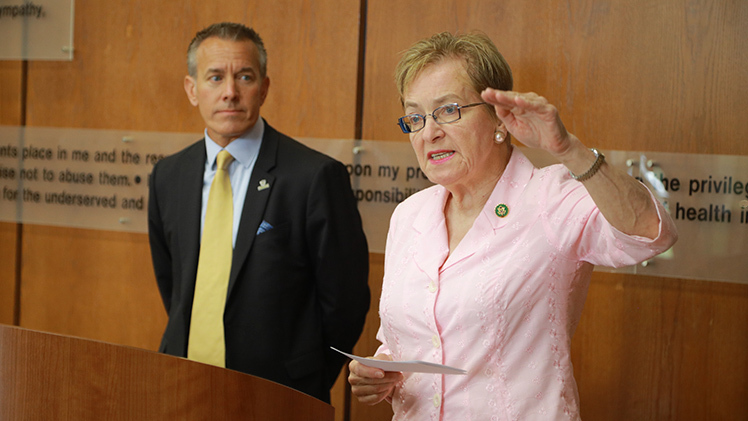The University of Toledo has received nearly $7 million from the federal government to update and expand its biosafety level 3 laboratory, enhancing the University’s ability to study dangerous pathogens and prepare against future pandemics.
The funding also will allow the University to make major infrastructure updates in other key biomedical research facilities.

U.S. Rep Marcy Kaptur announces the nearly $7 million in funding from the National Institute of Standards and Technology to improve key biomedical research facilities on Health Science Campus, including the University’s biosafety level 3 laboratory.
The $6.9 million grant, which comes from the U.S. Department of Commerce’s National Institute of Standards and Technology, was announced Wednesday by U.S. Rep. Marcy Kaptur at an event on UToledo’s Health Science Campus.
“New investment and upgrades at the Health Science Campus will better position its faculty to compete for federal research and to make discoveries important to protecting and sustaining life,” Kaptur said. “This NIST investment underscores the value in retaining and attracting world-class research to our region. To compete for world-class research opportunities, institutions such as UT’s College of Medicine and Life Sciences must be prepared with the right facilities and the right team. This award will help keep UT competitive from a facilities standpoint. We look forward to important advancements being achieved right here on our region’s only state medical research campus.”
“As the COVID-19 pandemic illustrated, biomedical research is critical for our ability to prepare for and respond to public health threats,” UToledo President Gregory Postel said. “We are grateful for this significant investment in our UToledo research enterprise and to be positioned as a leading university at the forefront of pandemic preparedness.”
Biosafety level 3, or BSL3, labs allow scientists to safely study some of the most highly transmissible pathogens in the world, such as influenza, tuberculosis, COVID-19, anthrax and plague.
Operated exclusively under negative air pressure, BSL3 labs are equipped with a range of specialized containment devices and high-efficiency air filtration to protect researchers and the environment.
UToledo’s existing BSL3 laboratory has been in place for several decades and is currently able to study only one pathogen at a time, said Dr. Jason Huntley, a professor in the Department of Medical Microbiology and Immunology, and director of the BSL3 lab.
The grant will enable UToledo to double the size of its lab and allow as many as six separate projects to be conducted concurrently.
“This is a transformational grant,” Huntley said. “We are going to have the opportunity to recruit new faculty, to study additional deadly diseases and build new partnerships. It also gives us more flexibility in responding more quickly to future infectious disease outbreaks.”
UToledo operates the only BSL3 lab in northwest Ohio and is one of just a handful located across the entire state.
“The major infrastructure projects that this grant is funding are going to lay the foundation for the next 25 to 30 years of biomedical research here at UToledo,” Huntley said. “These are the kinds of facilities that only the best universities have. We’re grateful to receive this grant and excited about the opportunities that await us.”
“Medical researchers must have the resources they need to protect us from the invisible threats that lurk within our world. The renovation of these bioscience lab facilities is a tangible manifestation of our commitment to these ideals,” Kaptur said. “Together, let us embrace the possibilities that lie ahead as we give our researchers the tools they need to ensure a brighter and healthier future for us all.”